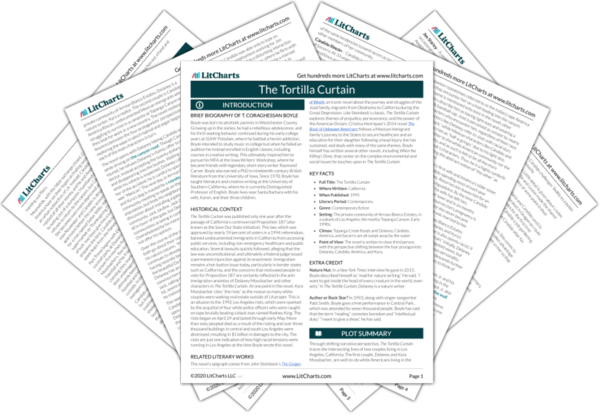The wall around Arroyo Blanco Estates is erected nearly two thirds of the way into the novel, and is a powerful symbol of the racist fear and resentment that permeates the entire book. The wall is a particularly important symbol in regard to Delaney’s character development. Delaney is initially opposed to the wall (and its precursor, the gate), though he is unwilling to publicly voice his opposition; by the end of the novel, he is spending countless hours in the rain and dark in order to discover who has defaced the wall. In this way, Delaney’s shifting relationship to the physical wall serves as a metaphor for his evolving relationship to the discrimination and paranoia the wall represents—which, by the end of the novel, he has come wholly to embrace. The wall is also important in the way that it fails to evoke a deeper sense of community among the residents of Arroyo Blanco. In theory, the wall was meant to make these residents feel both physically safer and more emotionally invested in the safety and wellness of their neighbors. Yet, the wall succeeds only in making people like Delaney even more paranoid than before, showing that defining and shunning a group of “outsiders” does relatively little to make the “insiders” feel any more content with their lives. In a rare moment of insight, Delaney also realizes “what [the wall] keeps in” when he overhears a local boy making foul-mouthed, racist jokes; in this moment, he recognizes the wall as “poisonous.” However, what Delaney fails to realize is that the wall itself is not a poison; rather, it is merely an externalization of the poisonous hatred that has been simmering amongst the residents of Arroyo Blanco all along.
The Wall Quotes in The Tortilla Curtain
He thought of the development he’d grown up in, the fenceless expanse of lawns, the shared space, the deep lush marshy woods where he’d first discovered ferns, frogs, garter snakes, the whole shining envelope of creation. There was nothing like that anymore. Now there were fences. Now there were gates.

Unlock explanations and citation info for this and every other The Tortilla Curtain quote.
Plus so much more...
Get LitCharts A+The wall. Of course. He should have guessed. Ninety percent of the community was already walled in, tireless dark men out there applying stucco under conditions that would have killed anybody else, and now the last link was coming to Delaney, to his own dogless yard, hemming him in, obliterating his view—protecting him despite himself. And he’d done nothing to protest it, nothing at all.












